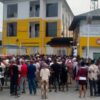There has also been worry that the plan is to re-enact the protests in Kenya, which was staged against some policies of President William Ruto, particularly the plan to impose more taxes on the people as millions of them suffer poverty amid rising prices. Unfortunately, the protest by Kenyans, which started peacefully later, became violent. At a point, the Kenya National Commission on Human Rights (KNCHR) announced that 39 people had died and 361 others seriously injured between June 18 and July 1, 2024. The commission also revealed that there were cases of ‘enforced or involuntary disappearances’ and 627 people arrested by the police, besides properties that were destroyed, all in relation to the protest. The fact that it happened in Kenya against hardship in that country does not mean it should happen in Nigeria. Surely the tragedy in Kenya is not what progressive Nigerians should aspire to emulate.
For some years now, Nigerians have been suffering hardship caused by multifaceted and complex factors that contributed to economic challenges, poverty, and social inequality. The situation has become worse since last year when the federal government under President Bola Tinubu removed subsidy on petrol triggering serious economic implications. Also since then, there has been high inflation rate, astronomical rise in the cost of living, foreign exchange rate volatility, unprecedented level of unemployment and worsening insecurity. The insecurity in the country, particularly in most of the northern states, has led to food scarcity as the farmers have been chased out of their farms by terrorists and other criminals. Besides, people cannot move or travel freely in many parts of the country for fear of being kidnapped, robbed and possibly killed, just as they cannot afford the high cost of transportation fuelled by constant hike in the price of petrol.
Today, millions of Nigerians find it extremely difficult to feed themselves and their families with the prohibitive prices of foodstuffs. Many parents are withdrawing their children from schools because of lack of money to sponsor them. A lot of Nigerians no longer go to hospitals for treatment of their ailments due to inability to afford the cost of medical services. The unemployment problem is aggravated by the exit of giant companies from Nigeria with thousands of their workers being thrown back into the already saturated labour market. About 30,000 workers have been reportedly thrown into the labour market since 2020, following the mass exodus of some multinational companies from Nigeria between 2020 and the first half of 2024.
Envisaging the hardship fuel subsidy removal would cause, President Tinubu appealed to Nigerians last year to endure the pain for a while for his administration to tackle the challenges of the country. He said subsidy removal would free money to fix the country. More than one year after, Nigerians cannot see the country being fixed. Hope that the country will overcome its woes dims by the day. It is lamentation everywhere.
Sadly government officials countrywide have failed to heed the trenchant call for reduction in the cost of governance so that money can be available for development projects and programmes that will directly and positively impact the living standard of the citizens. Governments’ cabinet size is considered too large, members of the National Assembly are collecting all kinds of humongous allowances and salary, billions of naira is being approved for private religious trips, government is sponsoring high number of delegates to summits in foreign countries, among other similar spendings; and corruption is still rife at all levels of government.
All Nigerians must work consciously to avoid the violence that may result from the rallies if hijacked by hoodlums and other mischief makers – not because the action is illegitimate. And the way to go is for the government to reach out to the leaders of the protest to douse the tension. The government has the machinery to do so. At such a meeting, the protesters should tell the government what the planned protest is all about and what they want the authorities to do. Both parties should agree on what should happen and possibly end the planned protest there.
In case the protest takes place as planned, its leaders should work sincerely with the police to ensure that it does not lead to anarchy and the government should also cooperate. The police should do their job professionally by giving protection to the protesters and ensuring that the rights of other Nigerians are not infringed upon. For this to happen, the protest planners should also cooperate with the police by adhering to all the requirements enunciated by the Inspector General. Nigerians must be very alert to ensure that while demanding good governance from their leaders, they do not unwittingly allow criminals to overrun them and end up giving their otherwise worthy cause a bad name.
Concluded








